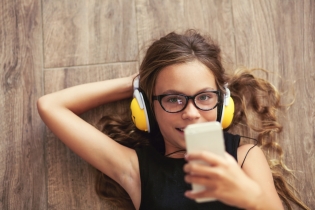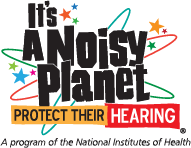Many enjoyable sounds that we hear every day are at safe levels that won’t damage our hearing. However, sounds can be harmful when they are too loud—even for a short time—or when they are long-lasting, even if they are not quite as loud. These sounds can damage part of the inner ear and cause permanent hearing loss. This permanent hearing loss can then worsen over a lifetime.
Who Is Affected?
Hearing loss from noise can happen to anyone at any age. Analyses from nationally representative health interview and examination surveys found that about one in seven U.S. teens ages 12 to 19 years (13-18 percent), and nearly one in four (24 percent) U.S. adults ages 20 to 69 years has features of his or her hearing test in one or both ears that suggest noise-induced hearing loss (NIHL).

How Do We Hear?
To understand how loud noises can damage our hearing, we have to understand how we hear. Hearing depends on a series of complex steps that change sound waves in the air into electrical signals. The auditory nerve then carries these signals to the brain for us to understand. Learn how sounds make their way from the source to your brain with this video and check out the How Do We Hear? fact sheet.
Noise-induced hearing loss happens when tiny hair-like structures (stereocilia) that sit on top of hair cells in the inner ear are damaged by noises that are too loud and/or last for too long. When stereocilia are damaged, the hair cells can’t send information about the sound to the brain. This leads to noise-induced hearing loss. This type of hearing loss is permanent.
How Sound is Measured
Sound is measured in units called decibels (dB). An increase of 10 dB seems about twice as loud to your ears, but it’s actually 10 times more intense, or powerful! Because people can’t hear all frequencies, or pitches of sound, A-weighted decibels (dBA) can be used to describe sound based on what human ears can actually hear. A whisper is 30 dBA and normal conversational speech is about 60-70 dBA.
The louder the sound, the shorter the amount of time it takes for possible hearing loss to occur. For example, firecrackers are often 160 dBA, and can cause hearing damage much more quickly than exposure to a power lawn mower at 80-100 dBA.
Causes and Effects
Hearing loss from noise can be caused by exposure to constant loud sounds over a long period of time, such as noise in a woodworking shop.
Many everyday activities can put kids at risk for hearing loss caused by noise. These activities include:
- Listening to music at high volume through earbuds or headphones.
- Playing in a band or orchestra.
- Attending loud concerts.
- Being around loud noises at home for a long period of time, such as lawnmowers or leaf blowers.
- Riding snowmobiles or motorcycles.
Hearing loss caused by noise can be temporary. For some people, hearing returns to its normal levels after 16 to 48 hours after exposure to loud noises. Recent research suggests, however, that there still may be long-term, permanent damage even if it isn't noticeable/detectable immediately.
Hearing loss due to loud noises can also build over time, so you may not readily notice the signs. As hearing loss progresses, people might:
- Complain of ringing or buzzing in the ear—called tinnitus. Tinnitus may go away over time, but it can sometimes continue for a long time or throughout a person’s life.
- Say “What?” more often or ask others to repeat what they’ve said.
- Turn up the sound on the TV or other devices.
If you or someone you know experiences any of these signs regularly, you should get your hearing checked to determine if you have a hearing loss.
Genes
Although everyone is at risk for noise-induced hearing loss, some individuals may be at higher risk due to their genetics. Our genes, inherited from our parents, carry the information that forms the building blocks of who we are. Some people inherit genes that make them more likely to develop noise-induced hearing loss. Scientists are working to figure out which genes increase the risk.
Prevent Noise-Induced Hearing Loss
Hearing loss from noise can often be prevented. The best way to make sure that your children continue to enjoy the sounds they love throughout life is to teach them practical ways to protect their hearing. These include:
- Lower the volume.
- Move away from the noise.
- Wear hearing protectors, such as earplugs or earmuffs. If hearing protection is not available, cover your ears with your hands.



